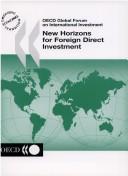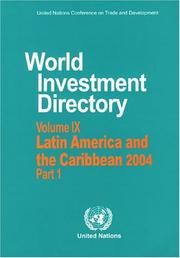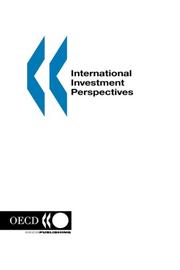| Listing 1 - 10 of 733 | << page >> |
Sort by
|
Book
ISBN: 9004611800 Year: 1964 Publisher: Leiden ; Boston : Brill,
Abstract | Keywords | Export | Availability | Bookmark
 Loading...
Loading...Choose an application
- Reference Manager
- EndNote
- RefWorks (Direct export to RefWorks)
Foreign investments. --- Foreign loans --- International contracts --- Private international law.
Book
ISBN: 1282966413 9786612966415 0821384791 0821384783 Year: 2011 Publisher: Washington, DC : World Bank,
Abstract | Keywords | Export | Availability | Bookmark
 Loading...
Loading...Choose an application
- Reference Manager
- EndNote
- RefWorks (Direct export to RefWorks)
Two years into the deepest global financial crisis in the post-war era, the world economy is still experiencing uneven economic recovery and financial weakness. Financial market conditions are signaling improved investor confidence and more appetite for cross-border investments. As part of its mandate to encourage investment to developing countries, the Multilateral Investment Guarantee Agency (MIGA) seeks to foster more understanding of the role of political risk, and instruments to mitigate it. The objective for this report is to examine (i) overall investment trends and perceptions of polit
Country risk. --- Investments, Foreign --- Political aspects. --- Country risk, Political --- Political risk (Foreign investments) --- Risk
Book
ISBN: 9789264294899 Year: 2001 Publisher: Paris : OECD Publishing,
Abstract | Keywords | Export | Availability | Bookmark
 Loading...
Loading...Choose an application
- Reference Manager
- EndNote
- RefWorks (Direct export to RefWorks)
Depuis qu’elle a recouvré son indépendance, en 1990, la Lituanie a connu une transformation économique remarquable. Dès la fin de 2000, ce processus avait été grandement stimulé par un apport de quelque 2.3 milliards de dollars d’IDE en provenance des pays européens, des Etats-Unis et des pays voisins. L’IDE a contribué aux investissements nouveaux, aux fusions-acquisitions et à la privatisation des entreprises d’Etat. La mise en place de conditions propices à l’IDE a été un élément central de la stratégie économique de la Lituanie, et à l’heure actuelle il subsiste relativement peu de restrictions dans ce domaine. L’IDE a été également encouragé par la perspective de l’entrée de la Lituanie dans l’UE et par son adhésion à l’Organisation mondiale du commerce, le 31 mai 2001. Parmi les grands chantiers en cours, on peut citer l’achèvement rapide des privatisations, la poursuite de la libéralisation et l’ouverture à la concurrence étrangère. Une priorité absolue est accordée au règlement des problèmes d’application découlant de la refonte de l’ancien régime réglementaire. Le 26 juillet 2001, la Lituanie a été admise à adhérer à la Déclaration de l’OCDE sur l’investissement international et les entreprises multinationales. Cela contribuera sans aucun doute à consolider ses avancées et à développer ses relations économiques avec les pays de l’OCDE et les autres adhérents à la Déclaration.
Investments, Foreign --- Capital exports --- Capital imports --- FDI (Foreign direct investment) --- Foreign direct investment --- Foreign investment --- Foreign investments --- International investment --- Offshore investments --- Outward investments --- Capital movements --- Investments --- Lithuania

ISBN: 1280031069 9786610031061 9264196471 9789264196476 9264197281 Year: 2002 Publisher: Paris : OECD Publishing,
Abstract | Keywords | Export | Availability | Bookmark
 Loading...
Loading...Choose an application
- Reference Manager
- EndNote
- RefWorks (Direct export to RefWorks)
The global economic slowdown and the significant decline in foreign direct investment (FDI) have made it even more imperative to attract international investment in order to achieve sustainable development and poverty reduction. The need to maximise the benefits of FDI compels host and home governments to move beyond the traditional policy of liberalising FDI. A broader set of policies for an enabling environment for investment must be embraced: competition, taxation, financial markets, trade, corporate governance, public administration, respect for workers and environmental rights, and other public policy goals. Developing policy frameworks to ensure that multinational enterprises contribute to development goals and capacity building also remain a priority issue on the international agenda. The OECD Global Forum on International Investment, at its inaugural meeting in Mexico City in November 2001, provided a unique platform for participants originating from OECD and non-OECD economies, representing academia, business and labour, and civil society to address the challenges posed by FDI. These selected conference papers add to the existing literature on FDI. They highlight the principal conclusions, include analyses of recent FDI trends and prospects, and discuss ways of maximising the benefits of FDI for development. The papers also examine lessons learned in OECD and non-OECD economies, governments’ responsibilities in FDI policies, corporate responsibility initiatives and the role of multilateral organisations in capacity building for FDI in host countries.
Investment. --- Investments, Foreign -- Congresses. --- Investments, Foreign. --- Investments, Foreign --- Investment & Speculation --- Finance --- Business & Economics --- Foreign Investments --- Investissements étrangers --- Congresses --- Congrès --- Investments --- Economic policy --- Investissements étrangers

ISBN: 9211126401 9211126428 9211126436 1417548592 9789211126433 9789211126426 Year: 2004 Publisher: New York (N.Y.): United Nations
Abstract | Keywords | Export | Availability | Bookmark
 Loading...
Loading...Choose an application
- Reference Manager
- EndNote
- RefWorks (Direct export to RefWorks)
Investments, Foreign --- E-books --- Capital exports --- Capital imports --- FDI (Foreign direct investment) --- Foreign direct investment --- Foreign investment --- Foreign investments --- International investment --- Offshore investments --- Outward investments --- Capital movements --- Investments

ISBN: 1281746975 9786611746971 9264026908 9264026894 Year: 2006 Publisher: Paris Oecd
Abstract | Keywords | Export | Availability | Bookmark
 Loading...
Loading...Choose an application
- Reference Manager
- EndNote
- RefWorks (Direct export to RefWorks)
The global environment for foreign direct investment (FDI) improved in 2005. Macroeconomic growth, traditionally one of the main drivers of direct investment, gained momentum in several OECD countries. In addition, corporate profitability was generally strong, interest rates were low and equity valuation in most countries was firm so ample liquidity was available to companies wanting to invest abroad. In this benign environment, overall FDI inflows to OECD countries grew by 27 per cent to reach US 623 billion in 2005. At the same time, OECD economies remained strong net contributors of direct
Investments, Foreign. --- Capital exports --- Capital imports --- FDI (Foreign direct investment) --- Foreign direct investment --- Foreign investment --- Foreign investments --- International investment --- Offshore investments --- Outward investments --- Capital movements --- Investments
Book
ISBN: 9264185720 9264185704 Year: 2012 Publisher: [Paris] : OECD,
Abstract | Keywords | Export | Availability | Bookmark
 Loading...
Loading...Choose an application
- Reference Manager
- EndNote
- RefWorks (Direct export to RefWorks)
Driven by technological change, global competition and the liberalisation of markets, international direct investment plays a key role in the process of global economic integration. OECD compiles and disseminates reliable and up-to-date statistics which are essential for a meaningful interpretation of investment trends for informed policy making. These statistics are based on official reports by OECD countries for investments world-wide. Internationally comparable data makes it possible to measure the degree of economic integration and competitiveness of markets.
Investments, Foreign. --- Capital exports --- Capital imports --- FDI (Foreign direct investment) --- Foreign direct investment --- Foreign investment --- Foreign investments --- International investment --- Offshore investments --- Outward investments --- Capital movements --- Investments
Book
ISBN: 926427605X 9264275983 Year: 2017 Publisher: Paris, [France] : OECD Publishing,
Abstract | Keywords | Export | Availability | Bookmark
 Loading...
Loading...Choose an application
- Reference Manager
- EndNote
- RefWorks (Direct export to RefWorks)
Investments, Foreign --- Government policy. --- Capital exports --- Capital imports --- FDI (Foreign direct investment) --- Foreign direct investment --- Foreign investment --- Foreign investments --- International investment --- Offshore investments --- Outward investments --- Capital movements --- Investments
Book
ISBN: 9211216230 1435612973 9781435612976 Year: 2007 Publisher: [Place of publication not identified] United Nations Publications
Abstract | Keywords | Export | Availability | Bookmark
 Loading...
Loading...Choose an application
- Reference Manager
- EndNote
- RefWorks (Direct export to RefWorks)
Investments, Foreign --- Capital exports --- Capital imports --- FDI (Foreign direct investment) --- Foreign direct investment --- Foreign investment --- Foreign investments --- International investment --- Offshore investments --- Outward investments --- Capital movements --- Investments --- E-books
Book
ISBN: 9211216680 1435689267 9781435689268 Year: 2008 Publisher: [Place of publication not identified] United Nations Publications
Abstract | Keywords | Export | Availability | Bookmark
 Loading...
Loading...Choose an application
- Reference Manager
- EndNote
- RefWorks (Direct export to RefWorks)
Investments, Foreign --- Capital exports --- Capital imports --- FDI (Foreign direct investment) --- Foreign direct investment --- Foreign investment --- Foreign investments --- International investment --- Offshore investments --- Outward investments --- Capital movements --- Investments --- E-books
| Listing 1 - 10 of 733 | << page >> |
Sort by
|

 Search
Search Feedback
Feedback About UniCat
About UniCat  Help
Help News
News